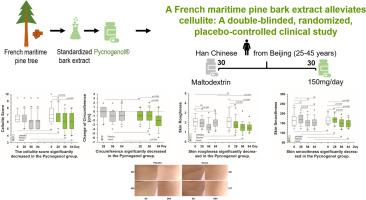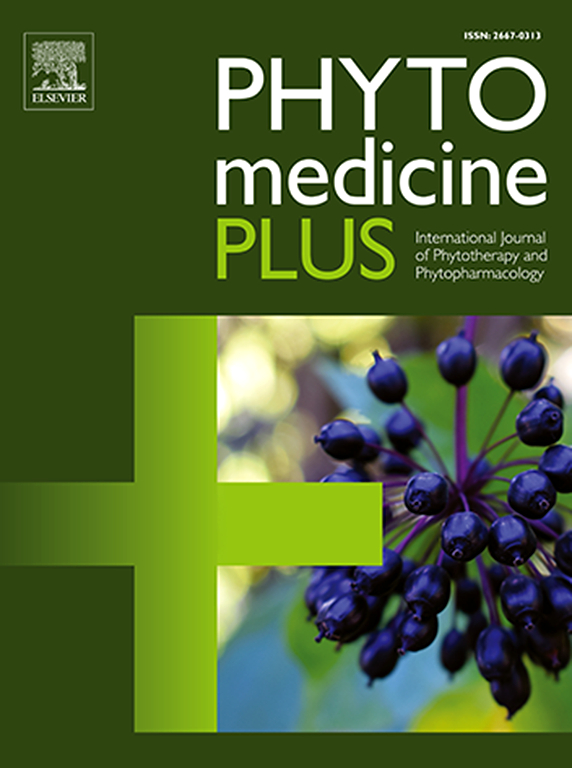A French maritime pine bark extract alleviates cellulite: A double-blinded, randomized, placebo-controlled clinical study
Q3 Pharmacology, Toxicology and Pharmaceutics
引用次数: 0
Abstract
Aims and objectives of the research
Cellulite presents with dimpling and denting of the skin surface. It mainly affects women, for whom it often poses a cosmetically unfavorable skin condition. Etiopathological knowledge is scarce, under discussion are, among others, inflammatory processes as well as dermal vascular and metabolic changes as found in chronic venous stasis. Besides topical regimes, there is growing interest in nutritional supplements as a strategy to ameliorate cellulite.
Materials and methodology
The standardized bark extract from the French maritime pine tree Pinus pinaster Aiton, subspecies atlantica (FMPBE), contains 70 ± 5 % procyanidins built from condensed catechin and epicatechin monomers. The extract is a nutritional supplement known for its antioxidative, anti-inflammatory, and vascular endothelium protective capacity. Based on its positive effects on endothelial health, we wanted to test the impact of this proprietary bark extract from the French maritime pine tree on cellulite.
Study design
In a randomized, double-blinded, placebo-controlled study with no follow-up, we asked if a moderate dose of 150 mg FMPBE a day over 3 months would affect (i) a clinical cellulite score, (ii) the thigh circumference, and (iii) physiological parameters such as roughness, and smoothness in 60 Han Chinese females aged between 25 and 45 years suffering from moderate cellulite. The subjects were recruited in a Beijing study center from November 2021 to February 2022. The occurrence of adverse events or serious adverse events was regularly recorded by phone. Results: No adverse or serious adverse events were observed. The clinical cellulite score significantly improved after 2 and 3 months by 12.2 % and 13.6 % in the verum group, corresponding to approximately 1 score point, whereas no significant effect was seen under placebo treatment. The improvement of the cellulite severity score was associated with clinical remediation shown by photographs and a significant decrease in the upper thighs’ circumference after 3 months. Skin roughness and skin smoothness were significantly ameliorated in the verum group.
Conclusion
FMPBE is suited to ease moderate cellulite and may help to prevent or postpone females against minimally invasive cellulite treatments.

法国海松皮提取物减轻脂肪团:一项双盲、随机、安慰剂对照的临床研究
研究目的和目的脂肪团表现为皮肤表面的凹陷和凹陷。它主要影响女性,对她们来说,它通常会造成不利于美容的皮肤状况。病因学知识是稀缺的,在讨论中,除其他外,炎症过程以及皮肤血管和代谢变化发现慢性静脉停滞。除了局部疗法,人们对营养补充剂作为一种改善脂肪团的策略越来越感兴趣。材料和方法:法国海松Pinus pinaster Aiton亚种atlantica (FMPBE)的标准树皮提取物含有70±5%的原花青素,由浓缩儿茶素和表儿茶素单体构成。提取物是一种营养补充剂,以其抗氧化,抗炎和血管内皮保护能力而闻名。基于其对内皮健康的积极作用,我们想测试这种专有的法国海松树皮提取物对脂肪团的影响。研究设计:在一项随机、双盲、无随访的安慰剂对照研究中,我们询问了60名年龄在25至45岁之间患有中度脂肪团的汉族女性,在3个月的时间里,每天服用中等剂量的150mg FMPBE是否会影响(i)临床脂肪团评分,(ii)大腿围,以及(iii)粗糙度和平滑度等生理参数。受试者于2021年11月至2022年2月在北京研究中心招募。定期电话记录不良事件或严重不良事件的发生情况。结果:未观察到不良或严重不良事件。在2个月和3个月后,verum组的临床脂肪团评分显著提高了12.2%和13.6%,相当于大约1分,而安慰剂治疗组没有明显的效果。脂肪团严重程度评分的改善与临床补救有关,照片显示,3个月后大腿上部围度显著减少。猪粪组的皮肤粗糙度和皮肤光滑度均有显著改善。结论fmpbe适合缓解中度脂肪团,并可能有助于预防或推迟女性微创脂肪团治疗。
本文章由计算机程序翻译,如有差异,请以英文原文为准。
求助全文
约1分钟内获得全文
求助全文
来源期刊

Phytomedicine Plus
Medicine-Complementary and Alternative Medicine
CiteScore
3.70
自引率
0.00%
发文量
178
审稿时长
81 days
期刊介绍:
 求助内容:
求助内容: 应助结果提醒方式:
应助结果提醒方式:


